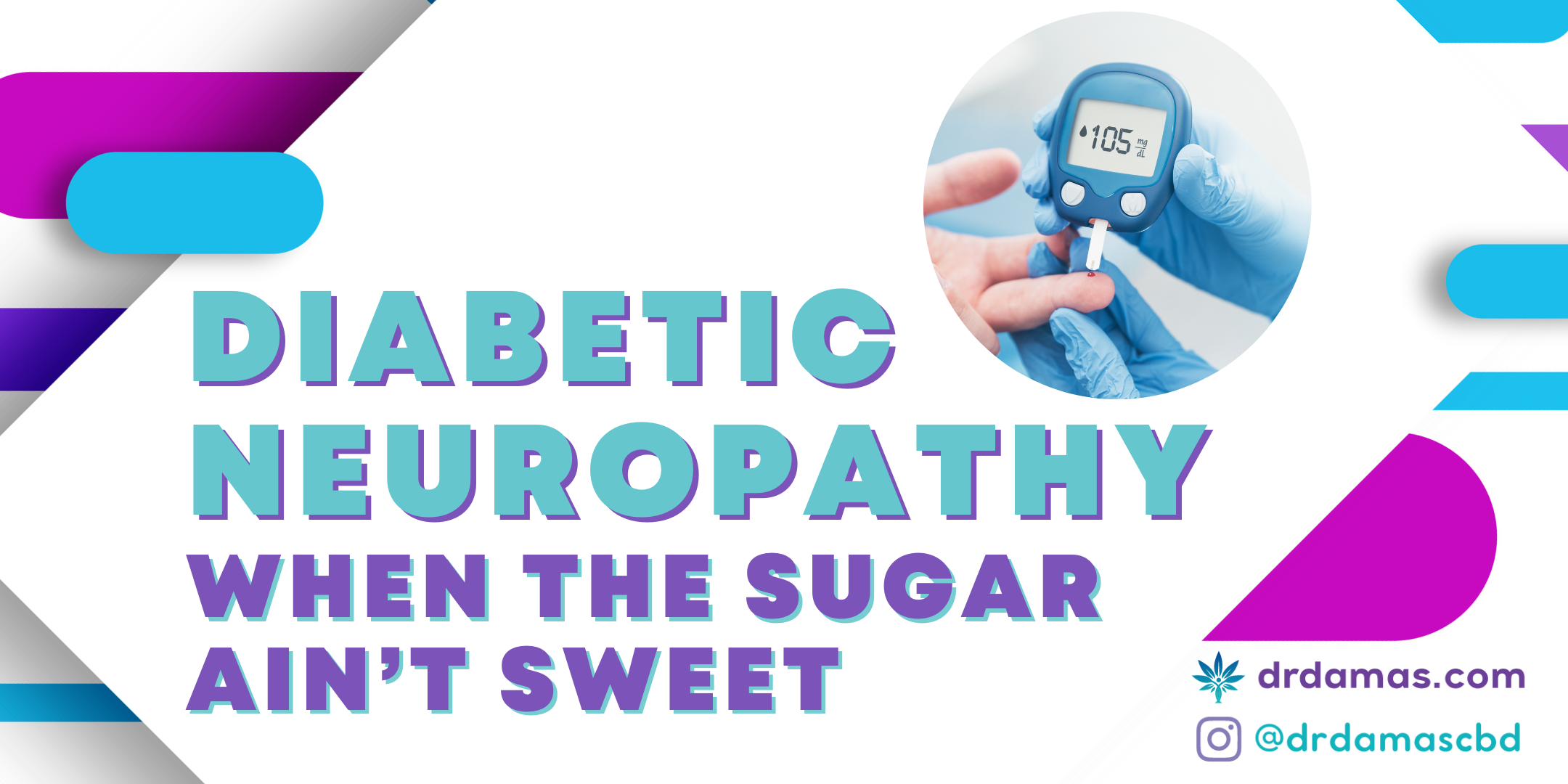Diabetic Neuropathy: When the Sugar Ain't Sweet
Diabetes or “The Sugar” as it’s called in some communities is a chronic disease that affects how your body turns food into energy. When left unmanaged, diabetes can lead to serious complications, one of the most common being diabetic neuropathy. That usually presents itself with feelings of tingling, numbness and pain that can severely affect the quality of life of diabetics. My father, like many other people of African descent living in the US, suffers from diabetes and diabetic neuropathy. He complains of constant pain in his feet, sleep disturbance due to pain and like many others, the disease has progressed to the point where he may need an amputation. It’s clear from all the data that neuropathy is a significant cause of suffering in people with high blood sugar. Today we’ll discuss what diabetic neuropathy is, the demographics affected by it most, traditional and holistic treatments, and the potential benefits of cannabis and CBD in managing symptoms.
What is Diabetic Neuropathy?
Diabetic neuropathy is a type of nerve damage that occurs in people with diabetes. High blood sugar levels can injure nerves throughout your body, but diabetic neuropathy most often damages nerves in your legs and feet. Symptoms can range from pain and numbness to digestive issues, urinary tract problems, and even heart complications.
Pearls:
Diabetic neuropathy affects up to 50% of people with diabetes over their lifetime, making it a significant concern for diabetic patients.
Early symptoms of diabetic neuropathy can be subtle, often starting as a slight tingling or numbness in the extremities.
Demographics of Diabetic Neuropathy
Diabetic neuropathy affects individuals across various demographics, with certain groups being more susceptible.
Age: The risk increases with age. Older adults are more likely to experience severe symptoms.
Gender: Studies indicate that men may be more likely to develop diabetic neuropathy than women.
Race: African Americans and Hispanics have a higher prevalence of diabetes and, consequently, diabetic neuropathy. According to the CDC, racial disparities in diabetes prevalence contribute to higher rates of complications like neuropathy among these groups.
Socioeconomic Status: Lower socioeconomic status is linked to higher rates of diabetes and complications like neuropathy due to limited access to healthcare and resources.
Pearls:
The incidence of diabetic neuropathy increases with the duration of diabetes, highlighting the importance of long-term disease management.
Lifestyle factors, such as poor diet and lack of physical activity, significantly contribute to the development of diabetic neuropathy.
Traditional Treatments
Traditional treatments for diabetic neuropathy focus on managing pain and controlling blood sugar levels.
Medications
Pros: Effective pain relief, easily accessible.
Cons: Potential side effects, does not address the underlying nerve damage.
Blood Sugar Management
Pros: Prevents further nerve damage, improves overall health.
Cons: Requires constant monitoring and lifestyle changes.
Pearls:
Tight blood sugar control can significantly reduce the risk of developing diabetic neuropathy by up to 60%.
Some medications used for diabetic neuropathy pain, like antidepressants and anti-seizure drugs, can also help with other diabetes-related symptoms.
Holistic Treatments
Holistic approaches are gaining popularity for their potential to manage symptoms with fewer side effects.
Acupuncture
Pros: Reduces pain, minimal side effects.
Cons: Requires multiple sessions, may not be covered by insurance.
Dietary Supplements
Pros: Can address nutritional deficiencies, supports overall health.
Cons: Limited scientific evidence, potential interactions with medications.
Pearls:
Alpha-lipoic acid, a dietary supplement, has shown promise in reducing diabetic neuropathy symptoms.
Acupuncture has been used in traditional Chinese medicine for thousands of years to manage pain and improve nerve function.
Cannabis and CBD for Diabetic Neuropathy
Cannabis and CBD are emerging as potential treatments for managing diabetic neuropathy symptoms. There are also studies suggesting that cannabis can help manage blood sugar levels, which could potentially benefit those with diabetes.
Routes of Administration
Inhalation (Smoking/Vaping): Quick relief, easy dosage control.
Topical (Creams/Oils): Targeted relief, minimal systemic effects.
Benefits
Pros: Effective pain relief, anti-inflammatory properties, minimal side effects with CBD.
Cons: Legal restrictions, potential for psychoactive effects with THC.
Studies have shown that cannabis and CBD can relieve neuropathic pain by interacting with the body's endocannabinoid system, which plays a role in regulating pain and inflammation. CBD, in particular, has been found to have neuroprotective properties that may help protect against nerve damage.
Pearls:
CBD has been found to reduce inflammation and pain without the psychoactive effects of THC, making it a safer option for many patients.
Topical CBD applications can provide localized relief without entering the bloodstream, reducing the risk of side effects.
Wrapping It All Up
We all probably know someone in our family that is suffering from diabetes and the challenges of diabetic neuropathy. In my case, I’ve been able to help my father improve his quality of life through the use of CBD softgels at night to help him sleep and a Rolliever to apply on his feet throughout the day. It’s helped him tremendously and it’s allowed him to avoid the use of narcotic pain relievers (which he does not want to use at all). He’s at a later stage in the course of the disease, but for others a combination of traditional and holistic treatments can be helpful in managing symptoms and delaying the progression of the disease.
Traditional treatments focus on pain relief and blood sugar control, while holistic methods like acupuncture and dietary supplements offer alternative approaches. Emerging research on cannabis and CBD shows promising potential for symptom management, with various routes of administration providing flexible options for patients. Always remember to speak with a healthcare provider before starting any new treatment options and if you’re considering CBD to only buy from trusted and high quality sources. And of course, if you have any questions feel free to contact us, we’d be happy to help you find the answers you’re looking for 🙂
Pearls:
Early detection and management of diabetic neuropathy can prevent severe complications and improve quality of life.
Ongoing research into the use of cannabinoids for diabetic neuropathy continues to uncover new therapeutic potentials, paving the way for future treatments.











